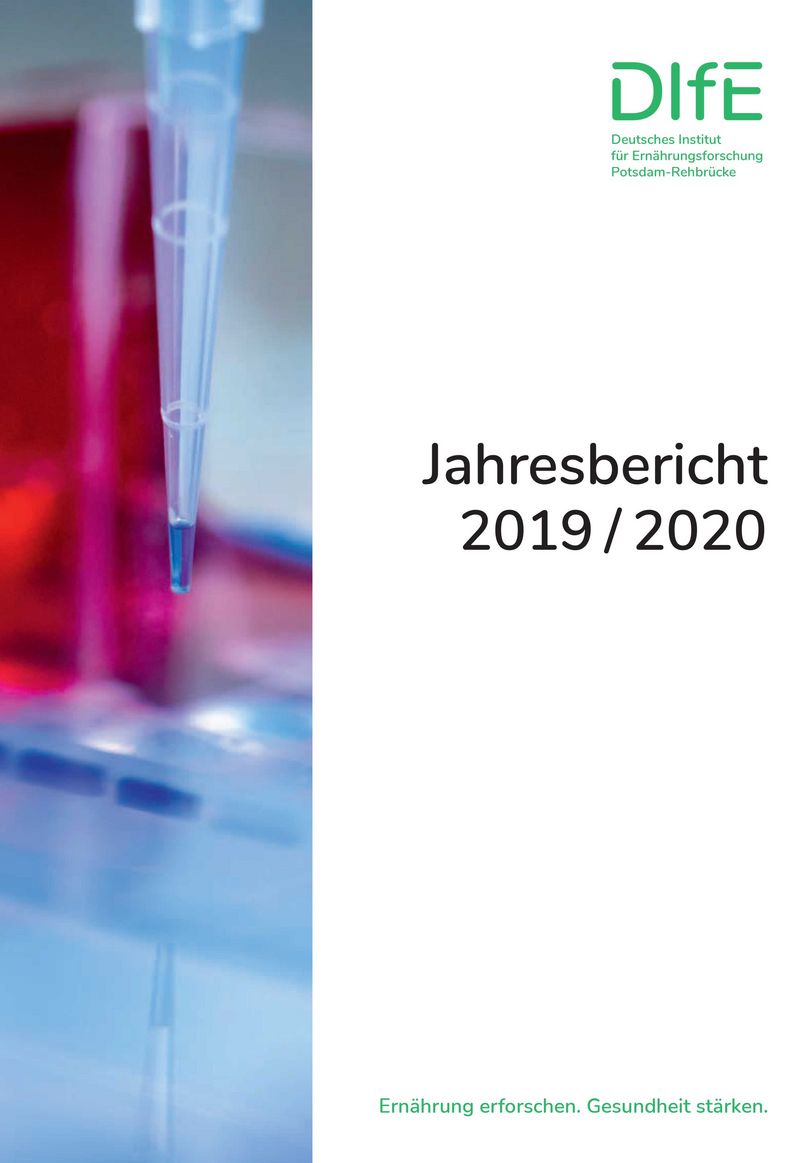Potsdam-Rehbrücke, 11.11.2021
DIfE Highlights at the Turn of the Decade: Biennial Report for 2019/2020 Now Available
How can healthy protein consumption and sustainable protein production be responsibly combined? Can micronutrients in the blood help detect frailty in elderly people at an early stage? And how do the views of others influence personal consumption decisions? The new biennial report of the DZD partner German Institute of Human Nutrition Potsdam-Rehbrücke (DIfE) informs in an appealing magazine style about these and selected research highlights as well as the diverse activities of the institute in 2019 and 2020.
Whether excellent research results, the welcoming of the 10,000th study participant to the GNC study center, the positive evaluation by the Leibniz Association, or the laying of the foundation stone and the topping-out ceremony for the new DIfE research building: richly illustrated and diversely designed, the 84-page report looks back on two eventful years at DIfE and conveys a comprehensive picture of the multifaceted and interdisciplinary work of the institute.
Brief portraits at the beginning of the report introduce the DIfE's departments, junior research groups and research groups, and the people behind the research.
Selected research highlights illustrate the topics that DIfE scientists are working on within the three main research areas. Interviews with two successful young researchers provide personal insights into their career development. The report also provides an insight into 10 years of diabetes research within the German Center for Diabetes Research and informs about projects, awards, events and other significant milestones of the last two years. Attractive graphics convey the most important facts and figures and visualize the institute's numerous networks.
The DIfE Biennial Report 2019/2020 (in German) is now available in print and online.
The digital biennial report can be downloaded at https://www.dife.de/fileadmin/1_Forschung/Publikationen/Jahresberichte/DIfE_Jahresbericht_2019-2020.pdf
Print copies can be ordered free of charge from presse(at)dife.de or by phone at 033200 88 2335.
Press contact
Press and Public Relations
German Institute for Human Nutrition Potsdam-Rehbrücke (DIfE)
Phone: +49 33 200 88 - 2335
E-Mail: presse(at)dife.de
The German Institute of Human Nutrition Potsdam-Rehbruecke (DIfE) is a member of the Leibniz Association. It investigates the causes of nutrition-associated diseases in order to develop new strategies for prevention, treatment and nutritional recommendations. Its research interests include the causes and consequences of the metabolic syndrome, a combination of obesity, hypertension (high blood pressure), insulin resistance and lipid metabolism disorder, the role of nutrition for healthy aging and the biological bases of food choices and dietary behavior. DIfE is also a partner of the German Center for Diabetes Research (DZD), which has been funded by the Federal Ministry of Education and Research (BMBF) since 2009. www.dife.de/en
Press contact

Birgit Niesing
niesing(at)dzd-ev.de
+49 (0)89 3187-3971
 |
